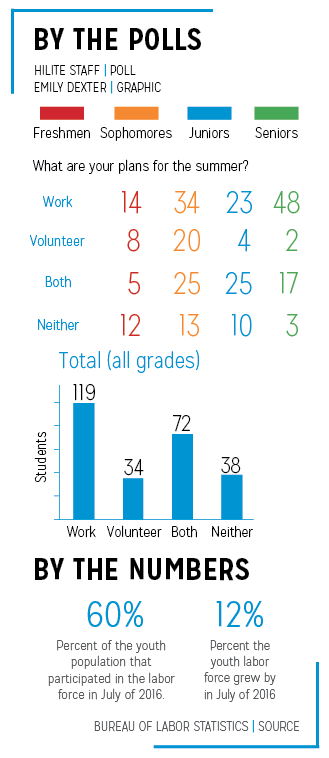When the word “summer” comes to mind, the average high-school student might think of sunny days at the beach or even summer classes. For students like senior Jacob Hughes, however, a typical summer encompasses something more: summer jobs.
Hughes said he will work as a lifeguard for his neighborhood pool over the summer. His job will involve lifeguarding, testing chemicals and cleaning. He plans to work four to five days a week, and his hours will generally be from 10 a.m. to 3 p.m. or from 3 p.m. to 8 p.m.
Just decades ago, a common summer schedule for a high school student resembled Hughes’s standard summer: having a summer job.Pew Research Center has conducted research with surprising results that emphasize the degree to which teen summer employment has plummeted within the recent decades. In July of 1974, teen employment ran as high as 57 percent. With July consistently representing the month with the greatest percentage of teen employment, in 2004, this percentage saw an unprecedented decline of 10 percent, resulting in only 44 percent of teens having a summer job. As of 2014, the summer employment rate on average had declined to around 33 percent.
Also according to the same study, for 18 and 19-year-olds, the summer employment rate last year was 43.6 percent, still well below the 62.6 percent average rate in the summer of 2000.
According to Gideon Navaro, the store manager of Bub’s Burgers and Ice Cream, a restaurant in downtown Carmel that has been hiring teenagers since its opening day in 2003, there has indeed been a decrease in the amount of teens applying for jobs.

Senior Jacob “Jake” Hughes uses the new app designed for creating work shift schedules. According to Hughes, there are only four lifeguards who work with him, and he knows they would rather work more shifts in order to work more hours.
 “A small part of the problem, in our case, is that sometimes teens are finding they can’t really work here unless they have more of a connection with the owners of the restaurant,” Navaro said. “More importantly though, it’s just not really that much of a social norm anymore to have a summer job, making it less desirable for teens to actually want a job in the first place.”
“A small part of the problem, in our case, is that sometimes teens are finding they can’t really work here unless they have more of a connection with the owners of the restaurant,” Navaro said. “More importantly though, it’s just not really that much of a social norm anymore to have a summer job, making it less desirable for teens to actually want a job in the first place.”
A USA Today article titled “Pew study: Teen employment rate falling,” bolsters Navaro’s claims by introducing a theory as to why summer teen employment rates are declining. It drew evidence from the Labor Department’s report, which indicates a proportional correlation between the decline in amount of employed teens and the increase in amount of teens who say that they do not want a job at all.
Unlike Hughes, junior Jason Shaw represents the development of the societal norm for teenagers today; he currently has no summer job. However, unlike what was proposed by Navarao and the Labor Department, Shaw said he has other reasons for not having a summer job.
“If I had to describe my summers, particularly the last summer, in one word, it would be hectic,” Shaw said. “With things such as changed standardized testing, college visits and in increase in the amount of summer classes I need to take, I simply have no time for a job.”
Shaw said he has also noticed a social norm that tends to focus less on the benefits of holding a summer job.
“I hang around academically strong students,” Shaw said. “In CHS especially, there are numerous of students who fall into this category where academic advantages such as taking AP classes in the summer or extensively practicing for SAT (subject) tests are crucial and deemed as the priority before anything else, including jobs.”
Shaw said he still understands the importance and acknowledges the benefits of holding any sort of job as a teenager.
“In the summer going (into) my sophomore year, one of my friends’ parents owned a Cold Stone Creamery store. They hired me, and it was only there did I learn essential skills such as time management and how to talk to people,” Shaw said.
Navaro said he also had a deep relationship with summer employment as a teenager, which he claims allowed him to be the person he is today.
“When I was 17, I worked in a fast-food restaurant. It helped me mold my work ethic completely by teaching me self-work and independence,” Navaro said. “It also made me realize that I was in love with the food industry.”
Regardless of what others believe, Hughes said he looks forward to another year as a lifeguard. He said nothing else can compare to the experience obtained from holding a job as a teenager, so it is imperative that he takes every measure necessary to retain his position as a lifeguard.
“I know a ton of friends of mine who party or just go to some exotic country to celebrate summer,” Hughes said. “I get my fair share, but I know that it’ll be more worth it if I spend my time doing something productive like working. The experience and growth I get as a human being already makes it well worth it, and the paycheck is a nice little cherry on top.”

































![AI in films like "The Brutalist" is convenient, but shouldn’t take priority [opinion]](https://hilite.org/wp-content/uploads/2025/02/catherine-cover-1200x471.jpg)









































![Review: “The Immortal Soul Salvage Yard:” A criminally underrated poetry collection [MUSE]](https://hilite.org/wp-content/uploads/2025/03/71cju6TvqmL._AC_UF10001000_QL80_.jpg)
![Review: "Dog Man" is Unapologetically Chaotic [MUSE]](https://hilite.org/wp-content/uploads/2025/03/dogman-1200x700.jpg)
![Review: "Ne Zha 2": The WeChat family reunion I didn’t know I needed [MUSE]](https://hilite.org/wp-content/uploads/2025/03/unnamed-4.png)
![Review in Print: Maripaz Villar brings a delightfully unique style to the world of WEBTOON [MUSE]](https://hilite.org/wp-content/uploads/2023/12/maripazcover-1200x960.jpg)
![Review: “The Sword of Kaigen” is a masterpiece [MUSE]](https://hilite.org/wp-content/uploads/2023/11/Screenshot-2023-11-26-201051.png)
![Review: Gateron Oil Kings, great linear switches, okay price [MUSE]](https://hilite.org/wp-content/uploads/2023/11/Screenshot-2023-11-26-200553.png)
![Review: “A Haunting in Venice” is a significant improvement from other Agatha Christie adaptations [MUSE]](https://hilite.org/wp-content/uploads/2023/11/e7ee2938a6d422669771bce6d8088521.jpg)
![Review: A Thanksgiving story from elementary school, still just as interesting [MUSE]](https://hilite.org/wp-content/uploads/2023/11/Screenshot-2023-11-26-195514-987x1200.png)
![Review: "When I Fly Towards You", cute, uplifting youth drama [MUSE]](https://hilite.org/wp-content/uploads/2023/09/When-I-Fly-Towards-You-Chinese-drama.png)
![Postcards from Muse: Hawaii Travel Diary [MUSE]](https://hilite.org/wp-content/uploads/2023/09/My-project-1-1200x1200.jpg)
![Review: "Ladybug & Cat Noir: The Movie," departure from original show [MUSE]](https://hilite.org/wp-content/uploads/2023/09/Ladybug__Cat_Noir_-_The_Movie_poster.jpg)
![Review in Print: "Hidden Love" is the cute, uplifting drama everyone needs [MUSE]](https://hilite.org/wp-content/uploads/2023/09/hiddenlovecover-e1693597208225-1030x1200.png)
![Review in Print: "Heartstopper" is the heartwarming queer romance we all need [MUSE]](https://hilite.org/wp-content/uploads/2023/08/museheartstoppercover-1200x654.png)




